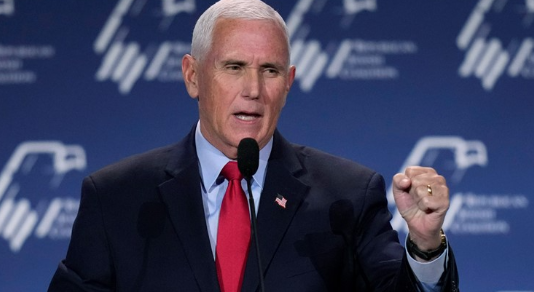On Oct. 28, after struggling to raise sufficient funds and earn constituent support, former Vice President Mike Pence used the Republican Jewish Coalition’s annual gathering in Las Vegas to announce the end of his 2024 presidential campaign.
“It has become clear to me: This is not my time,” Pence said. “So after much prayer and deliberation, I have decided to suspend my campaign for president effective today [Oct. 28]. We always knew this would be an uphill battle, but I have no regrets.”
After receiving a standing ovation for opening his speech with an endorsement of Israel’s military operations in Gaza, the surprise announcement was met with collective gasps. Yet Pence’s decision comes amid a Republican race that continues to be dominated by former President Donald Trump, whose strong poll numbers distinguish him as the frontrunner despite facing four criminal indictments and an ongoing civil fraud trial. Pence’s withdrawal marks the downfall of one of the most high-profile candidates to face defeat at the hands of his former boss after his campaign was left grappling with over $620,000 in debt and failed to gain the 70,000 individual donors needed to qualify for the third Republican presidential debate.
AP Government and Politics teacher Kristin Pommerenke-Schneider emphasized the challenge Pence and the remaining GOP candidates have faced in their attempt to combat Trump’s political supremacy due to the influence of poll results.
“The challenge in this age of Trump is that he seems to suck up all the oxygen in the room,” Pommerenke-Schneider said. “You’ve got nonpoliticians who are going to look at these polls and say, ‘Oh, Mr. Trump has been beating Biden significantly in the last five polls. And so if Trump is beating Biden, then it seems like Trump will be electable.’ Therefore, if he is so popular among the Republican Party and the Republicans themselves, what about these other candidates who are Republican? Will they even be able to get a chance at winning the Primary?”
In response to his announcement, Pence acquired considerable praise from the majority of his GOP colleagues. Fellow candidates South Carolina senator Tim Scott, former New Jersey governor Chris Christie, former South Carolina governor Nikki Haley, and Florida governor Ron Desantis expressed their support of the former vice president via X, quoting his strong leadership abilities and commitment to preserving conservative values on the national stage. On the other hand, business entrepreneur Vivek Ramaswamy and former President Donald Trump remained silent on the matter, opting not to release any public statements expressing their opinion.
Meanwhile, speculation has arisen as to how Pence’s absence will impact the remainder of the campaign season. On Nov. 8, the third Republican presidential debate showcased five candidates (Tim Scott, Nikki Haley, Ron Desantis, Vivek Ramaswamy, and Chris Christie) who discussed their viewpoints on topics ranging from abortion, immigration policy, the Russo-Ukraine war, the Israel-Hamas war, and Trump’s deteriorating reputation, who once again refused to be present. Although hostile remarks continued to be made toward one another based on differing ideologies, participants managed to evenly split their speaking time compared to previous debates as Scott led the night with nearly 19 minutes and Christie garnered the least at around 16 minutes.
That being said, Pommerenke-Schneider points to the Republican Party’s inability to adopt a balanced approach to policymaking as the root of their struggle to gain traction.
“Over the last nine months or so since McCarthy became Speaker of the House, you have had this rebellious part of the Republican Party who seemed more about ego and not compromise,” Pommerenke-Schneider said. “If you want to have an effective government, you need to have compromise. You need to have Democrats willing to work with Republicans and Republicans willing to work with Democrats.”
Ultimately, the GOP’s failure to achieve compromise has halted legislative progress, as seen throughout three weeks of juggling through candidates before Louisiana Representative Mike Johnson was appointed as Speaker of the House to fill McCarthy’s place on Oct. 25. Yet as the 2024 presidential election invariably draws nearer, the Republican Party’s struggle to collaborate both across the political aisle and amongst one another may prove to be a costly one.
















Cynthia Fey • Nov 10, 2023 at 8:33 am
Thanks for keeping us up to date on the race, including this week’s debate!